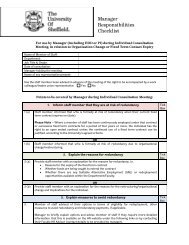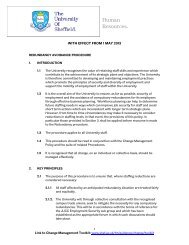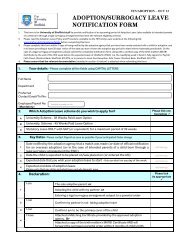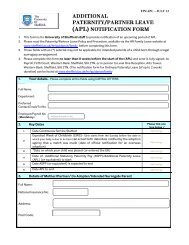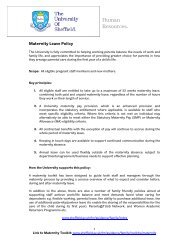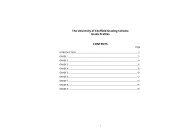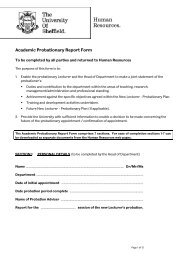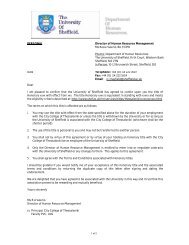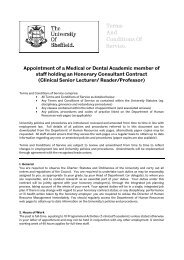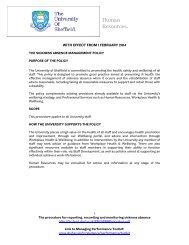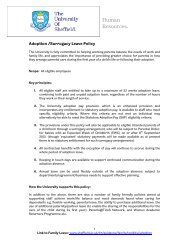Sickness Absence Management Procedure
Sickness Absence Management Procedure
Sickness Absence Management Procedure
You also want an ePaper? Increase the reach of your titles
YUMPU automatically turns print PDFs into web optimized ePapers that Google loves.
Human<br />
Resources.<br />
WITH EFFECT FROM 1 FEBRUARY 2014<br />
THE SICKNESS ABSENCE MANAGEMENT PROCEDURE<br />
1. INTRODUCTION<br />
1.1. The University is fully committed to supporting staff in achieving good attendance<br />
levels although it recognises that a staff member experiencing ill-health may<br />
require periods of sickness absence from time to time.<br />
1.2. <strong>Sickness</strong> in employment is defined as personal illness or injury which prevents a<br />
staff member from pursuing normal working activities or attendance. <strong>Absence</strong>s<br />
can be long term due to ill health or intermittent short term potentially as a result<br />
of an underlying condition or other factors e.g. infection etc.<br />
1.3. <strong>Sickness</strong> absence or ill health related to work, for example as a result of an<br />
injury/accident, should be managed in line with the university’s sickness absence<br />
policy. Where appropriate a risk assessment may be undertaken as part of the<br />
activity to prevent any continuing risk to the University’s staff/community.<br />
1.4. Disability Leave is a form of reasonable adjustment to enable staff with a disability<br />
to be absent from work without detriment in certain circumstances, for example<br />
to undergo treatment, assessment or rehabilitation related to the disability.<br />
The University and Joint Trade Unions are committed to reaching<br />
agreement on Disability Leave principles by Summer 2014.<br />
1.5. If personal or domestic problems are revealed or thought to be a contributory<br />
factor in attendance issues, the staff member shall be reminded of the confidential<br />
University services available and other leave provisions. Consideration may also be<br />
given to changing working arrangements on a temporary or permanent basis to<br />
support the individual in raising attendance to an acceptable level. Any permanent<br />
changes to a role should be subject to the staff member’s agreement where there<br />
may be contractual implications.<br />
1.6. Matters relating to: unauthorised absences, where there is no identified medical<br />
underlying cause or there is reasonable belief that the absence is not genuinely due<br />
to ill health, shall be investigated, including a referral to Workplace Health &<br />
Wellbeing where appropriate, and dealt with under the relevant Disciplinary<br />
<strong>Procedure</strong>. Matters relating to work performance shall be dealt with via the<br />
Capability procedure, and in the case of interpersonal relationship issues at work,<br />
1<br />
The procedure for reporting, recording and monitoring sickness absence<br />
http://hr.dept.shef.ac.uk/PM/SRRM<strong>Procedure</strong>.pdf<br />
Link to Managing Performance Toolkit:<br />
www.shef.ac.uk/hr/guidance/performance/toolkit
Human<br />
Resources.<br />
mediation may be appropriate. Human Resources may need to determine the most<br />
appropriate procedure.<br />
1.7. This procedure applies to all University staff and is in accordance with Section 6 of<br />
the University Charter and Statutes.<br />
1.8. The procedure should be read in conjunction with the Statutes and shall be<br />
applied to give effect to the guiding principles in paragraph 4 of Section6 of the<br />
University Statutes.<br />
2. MANAGING PERSISTENT SHORT-TERM SICKNESS ABSENCE – INFORMAL<br />
RESOLUTION<br />
2.1. During periods of sickness absence, staff will be responsible for keeping in regular<br />
contact with their manager.<br />
2.2. Each period of sickness absence should be discussed with the staff member, by<br />
the manager, upon their return to work (RTW) via a RTW discussion or interview.<br />
2.3. Where a potential cause for concern is identified, a manager should review the<br />
sickness absence record of the staff member and explore any concerns with<br />
him/her, agreeing any appropriate action or support needed, and setting review<br />
dates.<br />
2.4. The manager should seek to resolve minor issues informally and expediently<br />
whenever possible.<br />
2.5. The manager is encouraged to seek advice from Human Resources, and/or<br />
medical advice via a management referral to Workplace Health & Wellbeing, if<br />
appropriate, prior to determining the most appropriate course of action in order<br />
to support a sustained improvement in attendance.<br />
2.6. The manager should document any issue raised and discussed, including any<br />
agreed outcomes, support and timescales and retain these securely and<br />
confidentially in accordance with the Data Protection principles.<br />
2.7. Review meeting(s), at agreed time(s), should be scheduled to monitor/review the<br />
situation, and assess whether or not attendance has improved to a satisfactory<br />
level. Where expectations/targets have been met no further action will be<br />
required, though depending upon the circumstances of the case it may be<br />
appropriate to continue to monitor the situation.<br />
2<br />
The procedure for reporting, recording and monitoring sickness absence<br />
http://hr.dept.shef.ac.uk/PM/SRRM<strong>Procedure</strong>.pdf<br />
Link to Managing Performance Toolkit:<br />
www.shef.ac.uk/hr/guidance/performance/toolkit
Human<br />
Resources.<br />
2.8. If attendance has not reached sufficient sustained improvement the manager may<br />
decide to agree a further monitoring and review period, depending upon the<br />
circumstances of the case.<br />
3. FORMAL RESOLUTION<br />
3.1. If there has been insufficient sustained improvement in attendance levels, the<br />
manager should decide, in discussion with Human Resources, together with any<br />
medical advice, whether the individual’s failure to attend work regularly, justifies<br />
further action. Formal proceedings shall not begin until the manager has<br />
established the facts. In order to establish the facts the manager will collate all the<br />
relevant information, conducting further necessary enquiries as appropriate.<br />
The staff member will be notified in writing as to the outcome of this investigation.<br />
3.2. Potential formal options include:<br />
<br />
<br />
<br />
<br />
Further review periods and/or reasonable adjustments.<br />
The generation of individual management plans. For example, this may be<br />
appropriate in some cases where the illnesses/disability is likely to result in<br />
recurrent absences.<br />
Consideration of Ill Health Retirement (IHR)/redeployment if appropriate.<br />
A formal hearing (see Section 8 below). This may be appropriate where an<br />
investigation identifies a case of potential ill health incapacity.<br />
3.3. During the process, it may become apparent that another procedure is more<br />
suitable to resolve the issue. For example, the relevant disciplinary procedure may<br />
be more appropriate, should it be identified that the absences cannot be<br />
attributed to an underlying medical condition, or information comes to light that<br />
leads the manager to reasonably believe that the absences are not genuinely due<br />
to ill health.<br />
4. MANAGING LONG-TERM SICKNESS ABSENCE<br />
4.1. The manager should seek the advice of Human Resources in cases of long-term<br />
sickness absence of 4 weeks or more, sooner if there is an indication that the<br />
health issue may be related to work.<br />
3<br />
The procedure for reporting, recording and monitoring sickness absence<br />
http://hr.dept.shef.ac.uk/PM/SRRM<strong>Procedure</strong>.pdf<br />
Link to Managing Performance Toolkit:<br />
www.shef.ac.uk/hr/guidance/performance/toolkit
Human<br />
Resources.<br />
4.2. The manager should also maintain regular contact where possible, with the staff<br />
member in order to reduce feelings of isolation, to keep them up to date with<br />
departmental issues (e.g. office moves, changes within a team etc), where<br />
appropriate and to remain informed about the likely duration of the sickness<br />
absence and possible support that may be appropriate.<br />
4.3. The staff member should communicate regularly with his/her manager on<br />
progress or future medical consultations so that up to date information is<br />
provided.<br />
4.4. The manager may make a referral to Workplace Health & Wellbeing to gain advice<br />
on the staff member’s fitness for work, a likely date of return and where relevant a<br />
rehabilitation programme.<br />
4.5. The manager, in consultation with Human Resources and other relevant parties,<br />
e.g. a Health & Wellbeing Adviser where appropriate, will determine how to take<br />
the issue forward, (possibly in the form of a case management meeting).<br />
4.6. Where there is a prospect of recovery within a reasonable timeframe, with or<br />
without reasonable adjustments, the staff member should be supported in that<br />
recovery and in a return to work. In such cases a return to work plan should be<br />
developed and reviewed in discussion with the staff member, and where<br />
appropriate a risk assessment undertaken.<br />
4.7. The manager will be responsible for ensuring that the return to work plan is put<br />
into place. The staff member will also be responsible for cooperating with the<br />
implementation of the plan.<br />
4.8. Formal Resolution<br />
Where the medical opinion suggests that a return to the staff member’s existing<br />
role, within a reasonable timeframe, is not deemed possible due to the nature of<br />
the individual’s condition/circumstances (resulting in an actual or anticipated<br />
prolonged or indefinite absence) it may be necessary for the manager to<br />
discuss/consider other potential formal options, including;<br />
Redeployment, (including retraining as appropriate)<br />
Ill-health retirement<br />
A formal hearing (see Section 8 below).<br />
4.9. During the process, it may become apparent that it would be more appropriate to<br />
deal with the issue under a more relevant procedure.<br />
4<br />
The procedure for reporting, recording and monitoring sickness absence<br />
http://hr.dept.shef.ac.uk/PM/SRRM<strong>Procedure</strong>.pdf<br />
Link to Managing Performance Toolkit:<br />
www.shef.ac.uk/hr/guidance/performance/toolkit
Human<br />
Resources.<br />
4.10. All relevant options will be fully explored by the manager, with input from Human<br />
Resources, taking into account Workplace Health & Wellbeing advice, and<br />
discussed with the individual and the representative as appropriate. The staff<br />
member will be notified in writing as to the outcome of these considerations.<br />
5. REASONABLE ADJUSTMENTS<br />
5.1. The manager will be responsible for providing the necessary support and<br />
assistance to enable a staff member to continue in employment, through the<br />
provision of reasonable adjustments. This will be done in consultation with the<br />
individual, in line with our legal responsibilities and as a good practice employer.<br />
The manager should seek advice as appropriate. Please refer to the Managing<br />
Performance Toolkit for additional guidance.<br />
5.2. Where appropriate, a phased return may be agreed to provide a supported<br />
transition and re-integration back into the work place after an extended period of<br />
sickness absence. The basis and structure of a phased return will be developed in<br />
discussion with the staff member, taking into account the individual circumstances<br />
of the case.<br />
5.3. Where a Department is unable to meet the purchase costs of any adjustments<br />
required, they may make an application to the University´s central fund for<br />
reasonable adjustments in addition to seeking external assistance if available.<br />
6. REDEPLOYMENT<br />
6.1. Managers will be responsible for exploring the possibility of redeployment to an<br />
alternative role within the University, where Workplace Health & Wellbeing advice<br />
indicates that it is unlikely that a staff member will be able to carry out the<br />
particular duties of their current post (with or without reasonable adjustments)<br />
within the foreseeable future.<br />
7. ILL HEALTH RETIREMENT<br />
7.1. Where a staff member’s health has deteriorated such that they can no longer<br />
perform their duties, and all reasonable efforts to redesign the job or redeploy the<br />
individual have been unsuccessful or are not practicable, then it may be<br />
appropriate for retirement on grounds of ill-health to be considered.<br />
5<br />
The procedure for reporting, recording and monitoring sickness absence<br />
http://hr.dept.shef.ac.uk/PM/SRRM<strong>Procedure</strong>.pdf<br />
Link to Managing Performance Toolkit:<br />
www.shef.ac.uk/hr/guidance/performance/toolkit
Human<br />
Resources.<br />
7.2. The rules of the Pension Schemes operated by the University include provisions<br />
for retirement on grounds of ill health, subject to qualifying conditions. Enquiries<br />
about ill health retirement may be addressed in the first instance to Human<br />
Resources who will treat any such enquiries in the strictest confidence.<br />
7.3. Ill health retirement is not automatic and only granted after the approval of the<br />
relevant pension fund's trustees. The Trustees decision would be based on the<br />
medical evidence presented.<br />
8. CAPABILITY HEARING<br />
8.1. It may be necessary to consider terminating the contract should the staff member<br />
become incapable of performing his/her duties due to ill health. This may need to<br />
be considered where adjustments, redeployment and ill health retirement are<br />
deemed to be: unreasonable; unavailable; ineffective or inappropriate.<br />
8.2. A capability hearing can only be invoked with the involvement of Human Resources,<br />
and after the facts have been established, including a management referral to<br />
Workplace Health & Wellbeing if not already done so, or where up to date<br />
information is required. In cases where a staff member chooses to withhold<br />
consent to disclose medical reports or Workplace Health & Wellbeing’s ability to<br />
access medical information, decisions regarding further employment shall be<br />
made on the basis of the information available.<br />
9. NOTIFICATION OF A CAPABILITY HEARING<br />
9.1. Where there is found to be a need to proceed to a formal hearing, the staff<br />
member will be invited, in writing, to attend the hearing. The notice will usually be<br />
provided no later than 7 calendar days in advance of the hearing. For academic,<br />
teaching and research staff, the notice provided will usually be 21 calendar days in<br />
advance of the hearing, unless agreed by all parties that a shorter period would be<br />
appropriate.<br />
9.2. The staff member will be advised in the letter of the reasons for the meeting, the<br />
nature of the proposed discussion and possible outcomes.<br />
9.3. No less than 7 calendar days (usually 21 calendar days for academic, research and<br />
teaching staff) in advance of the hearing the staff member will be provided with all<br />
the evidence that will be referred to during proceedings. This may include written<br />
documents depending upon the details of the case. The exact material to be<br />
provided to the staff member shall vary according to details of the case. Where<br />
further time is required to consider the evidence, there will be the ability to seek a<br />
reasonable adjournment where appropriate.<br />
6<br />
The procedure for reporting, recording and monitoring sickness absence<br />
http://hr.dept.shef.ac.uk/PM/SRRM<strong>Procedure</strong>.pdf<br />
Link to Managing Performance Toolkit:<br />
www.shef.ac.uk/hr/guidance/performance/toolkit
Human<br />
Resources.<br />
9.4. If the staff member decides to provide any documentation in support of his/her<br />
case, the staff member should provide these in advance of the hearing. The staff<br />
member will be advised in writing of the timescales (which will usually be a<br />
minimum of 7 calendar days unless agreed otherwise) and the process for<br />
providing such information. Where further time is required to consider the<br />
evidence, the panel have the ability to implement a reasonable adjournment.<br />
During formal proceedings the staff member can be accompanied by a companion.<br />
This may be: either a fellow worker; a workplace Trade Union representative; or an<br />
official employed by a Trade Union, and the staff member will be notified of this<br />
statutory right within the letter.<br />
10. HEARING FORMAT<br />
10.1. At the hearing the Chair should outline to the staff member: the nature of the<br />
attendance/ill health issue; impact of absence(s) and the actions/support already<br />
implemented/considered; and improvements in attendance required. Reference<br />
should also be made at this stage to any medical opinion relevant to the case. The<br />
individual will be given the opportunity to state their case.<br />
10.2. The panel membership will consist of a minimum of 2 members (unless otherwise<br />
agreed), who will be appropriately skilled University managers. The panel<br />
membership shall be made known to the staff member in advance of the hearing,<br />
and the staff member should raise any concerns with regards to the panel in<br />
advance.<br />
10.3. In all cases where dismissal of a member of academic, research or teaching staff is<br />
an option, panel membership shall include at least one Officer of the University, or<br />
delegate, selected from the approved List of Potential Panel Members provided in<br />
accordance with the Statutes, Section 6, paragraph 7, and not being a person<br />
subject to or otherwise connected with the proceedings.<br />
10.4. The panel should seek to explore with the individual the reasons for the<br />
absence(s) and any potential reasonable interventions or support which may be<br />
needed to remedy the situation.<br />
10.5. The panel will consider the case and decide what the appropriate action should be.<br />
7<br />
The procedure for reporting, recording and monitoring sickness absence<br />
http://hr.dept.shef.ac.uk/PM/SRRM<strong>Procedure</strong>.pdf<br />
Link to Managing Performance Toolkit:<br />
www.shef.ac.uk/hr/guidance/performance/toolkit
Human<br />
Resources.<br />
10.6. Formal remedies/action will be either:<br />
decision deferred pending further medical information<br />
further consideration in relation to reasonable adjustments, supported by<br />
further monitoring/review periods<br />
further consideration in relation to redeployment, or retirement options,<br />
referral to another more relevant procedure<br />
dismissal relating to the capability of the staff member<br />
any other reasonable options agreed by both the University and the staff<br />
member<br />
10.7. The staff member will be informed of the outcome, in writing within 7 calendar<br />
days following the hearing. Where the usual timeframe is not practicable, this will<br />
be communicated, with reasons and an alternative timeframe specified.<br />
10.8. Where a remedy/action other than dismissal is identified, where appropriate the<br />
letter (referred to in paragraph 10.6 above) will advise of any agreed<br />
action/support, and caution that should the chosen option not result in necessary<br />
improvements or prove unsuccessful, within a defined timescale, dismissal could<br />
result.<br />
10.9. The staff member will also be advised of the right of appeal.<br />
11. DISMISSAL<br />
11.1. In reaching a decision on dismissal careful consideration of other options will be<br />
given. If, on balance, the other options are deemed inappropriate due to the<br />
circumstances of the case, and the staff member is dismissed, they will be<br />
provided in writing with reasons for dismissal, the date on which the employment<br />
will terminate, and the right of appeal and arrangements.<br />
11.2. The authority to dismiss rests only with the Director of Human Resources or as<br />
delegated.<br />
12. APPEALS<br />
12.1. A staff member’s written outcome letter will include details of the arrangements<br />
to follow should s/he decide to appeal, e.g. to whom to appeal.<br />
8<br />
The procedure for reporting, recording and monitoring sickness absence<br />
http://hr.dept.shef.ac.uk/PM/SRRM<strong>Procedure</strong>.pdf<br />
Link to Managing Performance Toolkit:<br />
www.shef.ac.uk/hr/guidance/performance/toolkit
Human<br />
Resources.<br />
12.2. Staff intending to appeal against the decision of the meeting, must do so promptly,<br />
usually within 7 calendar days of receipt of the written outcome letter. Should the<br />
individual require additional time to submit an appeal, s/he may make a request to<br />
Human Resources, for a reasonable extension.<br />
12.3. The request to appeal should be communicated in writing, stating the grounds<br />
upon which the appeal is based. Grounds for appeal might be: the process was not<br />
appropriately followed; there is new evidence relevant to the case which was not<br />
previously available; or the hearing outcome is deemed to be disproportionate.<br />
12.4. The appeal is not a rehearing of the original hearing, but rather a consideration of<br />
the specific area with which the staff member is dissatisfied in relation to the<br />
original hearing. The appeal panel will therefore confine discussion to those<br />
specific areas rather than reconsider the whole matter afresh.<br />
12.5. The appeal will be chaired by a Senior University Manager, and a member of<br />
Human Resources will support the appeal process. Neither would usually have<br />
been previously involved in the case. Where the staff member exercising the right<br />
of appeal is a member of academic, research or teaching staff, panel membership<br />
shall include at least one Officer of the University, or deputy, selected from the<br />
approved List of Potential Panel Members provided in accordance with the<br />
Statutes, Section 6, Paragraph 7. The Chair will ensure that the number of people<br />
present at the appeal meeting is kept to a minimum. The appeal would usually be<br />
considered within 14 calendar days of receipt of the application.<br />
12.6. Where the appeal is against dismissal a senior member of Human Resources will<br />
set up and service the Appeal Panel comprising: (i) A Pro-Vice-Chancellor [or<br />
nominee]; (ii) One member of the University’s Human Resources Committee; (iii)<br />
One appropriate staff member of the University, nominated by the Chair of Panel<br />
(acting on behalf of the University) and agreed by the relevant Trade Union (where<br />
applicable).<br />
12.7. In the case of appeals against the dismissal of a member of academic, research or<br />
teaching staff the panel shall include : (i) One Officer of the University, or deputy;<br />
(ii) One independent professional or academic nominated by Council, who is not<br />
employed by the University (both shall be selected from the approved List of<br />
Potential Panel Members provided in accordance with the Statutes, Section 6,<br />
Paragraph 7); and (iii) One appropriate staff member of the University nominated<br />
by the Chair of Panel (acting on behalf of the University) and agreed by the<br />
relevant Trade Union (where applicable). Panel members will not have previous<br />
involvement or be otherwise connected with the proceedings.<br />
9<br />
The procedure for reporting, recording and monitoring sickness absence<br />
http://hr.dept.shef.ac.uk/PM/SRRM<strong>Procedure</strong>.pdf<br />
Link to Managing Performance Toolkit:<br />
www.shef.ac.uk/hr/guidance/performance/toolkit
Human<br />
Resources.<br />
12.8. At the appeal meeting the documentary evidence made available at the original<br />
hearing will be made available for reference purposes. As the purpose of the<br />
appeal meeting is not a reconsideration of all matters, it is the responsibility of the<br />
staff member to state the case and bring to the attention of the panel all relevant<br />
documentary evidence that should be considered. Based on the appeal case<br />
presented and the associated evidence, the appeal panel may either: uphold the<br />
grounds for appeal, reject the grounds for appeal, or require a rehearing of the<br />
whole or part of the case.<br />
12.9. Where a full or partial rehearing is required, the appeal panel may conduct such a<br />
rehearing should the panel deem it appropriate. The staff member can request<br />
that such a rehearing takes place at a later date.<br />
12.10. Where appropriate the staff member will have the opportunity to comment on any<br />
new evidence arising during an appeal. All new evidence will have been disclosed<br />
in advance according to timescales agreed for the case.<br />
12.11. The staff member will be informed in writing of the appeal outcome, usually within<br />
7 calendar days of the appeal meeting. If the timescales are to be longer, this will<br />
be communicated.<br />
12.12. In the case of a rehearing an appeal of the rehearing outcome would be<br />
permissible.<br />
12.13. The Panel’s decision is final.<br />
13. OTHER PROVISIONS<br />
13.1. It may be appropriate at any stage of this procedure for Human Resources, in<br />
consultation with the staff member’s manager and Workplace Health & Wellbeing<br />
(including Health & Safety if appropriate), to suspend the staff member on<br />
medical grounds, (e.g. where the health and /or safety of the individual or other<br />
University staff/members of the University community are placed at a risk which<br />
cannot be reasonably mitigated or removed). During a suspension the staff<br />
member will receive sick pay in accordance with the arrangements as set out in<br />
his/her terms and conditions of employment. The reasons for such a decision will<br />
be provided to the staff member in writing and reviewed regularly.<br />
10<br />
The procedure for reporting, recording and monitoring sickness absence<br />
http://hr.dept.shef.ac.uk/PM/SRRM<strong>Procedure</strong>.pdf<br />
Link to Managing Performance Toolkit:<br />
www.shef.ac.uk/hr/guidance/performance/toolkit
Human<br />
Resources.<br />
13.2. During all stages of formal proceedings, the staff member can be accompanied by<br />
a companion. This may be: either a fellow worker, a workplace Trade Union<br />
representative, or an official employed by a Trade Union. The staff member should<br />
advise whether the secretary of the panel should copy the staff member’s<br />
representative into all relevant documentation.<br />
13.3. At any hearing or appeal hearing, the companion will be able to address the<br />
hearing in order to: put the staff member’s case forward; sum up the case;<br />
respond on the staff member’s behalf to any view expressed in the hearing and<br />
confer with the individual. The representative should not normally answer<br />
questions on behalf of the staff member, but may do so with the agreement of the<br />
panel.<br />
13.4. The University acknowledges the sensitivities surrounding ill health and deems it<br />
preferable that the staff member attends any meeting in person. Appropriate<br />
arrangements, including travel arrangements, will be made to ensure that this is<br />
possible. However, in exceptional circumstances where a staff member is unable<br />
to travel to the University, all reasonable efforts will be made to enable the<br />
meeting to take place at a mutually agreed alternative location. If a staff member is<br />
absent due to sickness prior to the hearing, s/he may be invited to visit the<br />
University’s Workplace Health & Wellbeing to assess his/her fitness to attend a<br />
hearing, and to give advice on any special requirements or adjustments for the<br />
hearing.<br />
13.5. Every effort should be made by all participants to attend hearings as arranged.<br />
Hearings will be made at date/times that are mutually acceptable, wherever<br />
possible. Where a staff member fails to attend on more than two occasions, the<br />
University may decide that a decision should be made in his/her absence on the<br />
evidence available at the third scheduled hearing.<br />
13.6. Where a staff member seeks to activate a formal procedure e.g. submits a<br />
grievance or an appeal within another procedure during a sickness absence<br />
management process, which is related to the case, it may be appropriate to deal<br />
with the issues as part of, or concurrently with, this procedure. Alternatively the<br />
capability panel may deem it appropriate to temporarily suspend the sickness<br />
absence proceedings pending the outcome of the other procedural process in<br />
order to safeguard the fairness of the process.<br />
11<br />
The procedure for reporting, recording and monitoring sickness absence<br />
http://hr.dept.shef.ac.uk/PM/SRRM<strong>Procedure</strong>.pdf<br />
Link to Managing Performance Toolkit:<br />
www.shef.ac.uk/hr/guidance/performance/toolkit
Human<br />
Resources.<br />
13.7. Time limits are indicated in calendar days and are included in the procedures in<br />
order to ensure that matters are dealt with promptly and without undue delay.<br />
Neither the University nor staff members should unreasonably delay<br />
meetings/hearings, decisions or confirmation of those decisions. However, in<br />
complex matters it may be appropriate to extend time limits provided in the<br />
<strong>Procedure</strong>.<br />
13.8. Where a staff member believes that an aspect of a disability (e.g. hearing<br />
difficulties, chronic fatigue etc) or language skills (e.g. English is not his/her first<br />
language) may impact on the ability to participate as appropriate in the procedure,<br />
it is the staff member’s responsibility to raise this with Human Resources as soon<br />
as possible. In such cases the University may consider providing appropriate<br />
reasonable support/adjustments during formal proceedings. Panel members shall<br />
be advised of any reasonable adjustments to be made.<br />
13.9. No formal action should be taken against accredited trade union representatives<br />
until there has been discussion with the appropriate official employed by the<br />
Trade Union, in order to ensure compliance with the provisions of employment<br />
legislation. Medical suspension will also be discussed in advance of its use.<br />
13.10. Records of action taken under the sickness absence management procedure will<br />
be kept confidential and retained in accordance with the Data Protection Act<br />
[1998]. When discussing issues relating to ill health and sickness absence with a<br />
staff member, the individual should be advised that the conversation will remain<br />
confidential, but that it may be necessary to disclose certain details to relevant<br />
parties to ensure all relevant support is considered, the procedure can be<br />
implemented, and the University’s duty of care is met.<br />
13.11. Human Resources shall regularly monitor equality statistics relating to sickness<br />
absence matters and these will be shared with the Human Resources Committee<br />
(HRC) and the Joint Union and Campus Committee (JUCC).<br />
13.12. The <strong>Procedure</strong> was formally approved by HRC and agreed by JUCC on 20 January<br />
2014.<br />
12<br />
The procedure for reporting, recording and monitoring sickness absence<br />
http://hr.dept.shef.ac.uk/PM/SRRM<strong>Procedure</strong>.pdf<br />
Link to Managing Performance Toolkit:<br />
www.shef.ac.uk/hr/guidance/performance/toolkit


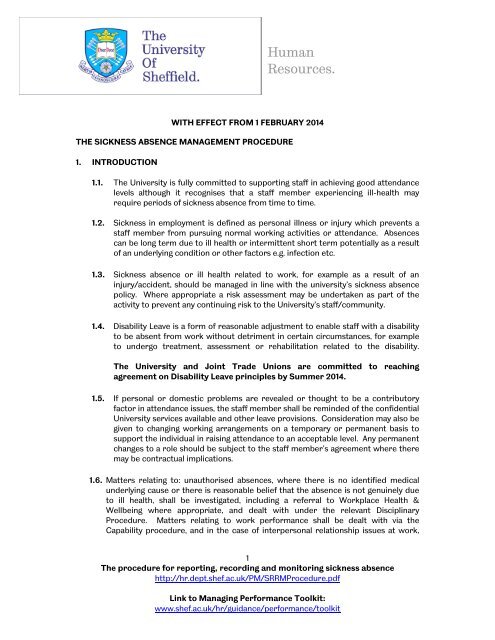
![Additional Leave Application Form [pdf] - University of Sheffield](https://img.yumpu.com/51244925/1/184x260/additional-leave-application-form-pdf-university-of-sheffield.jpg?quality=85)
![Flexible Working Appeals Form [pdf]](https://img.yumpu.com/46475544/1/184x260/flexible-working-appeals-form-pdf.jpg?quality=85)
